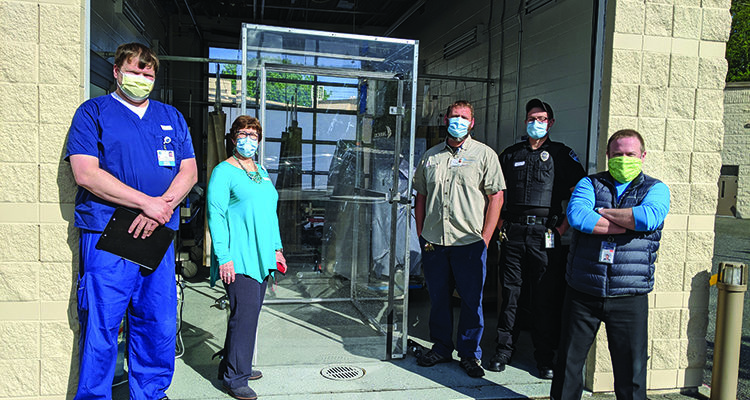Skagit Valley is an idyllic region in northwestern Washington, renowned for its tulip fields and berry farms in the south and the breathtaking peaks of the
Cascade Mountains in the north. It’s also home to dozens of close-knit communities where neighbors take care of one another. That compassion has been on display during the COVID-19 pandemic, with more than 400 Skagit County residents testing positive for the coronavirus as of mid-May.
Janicki Industries, a fourth-generation, family-owned business in Sedro-Woolley, Wash., has a long history of giving back to the community. Local children play baseball and softball at the Janicki Fields, and the company supports groups such as the Rotary Club, Boy Scouts and United Way. So when Janicki Industries began getting requests to make equipment for the fight against COVID-19, it was a “natural fit” to lend a hand, says Andy Bridge, vice president of industrial and emergent markets for Janicki. The company designed and fabricated portable isolation treatment booths and intubation boxes for two local hospitals. “We are good at designing, engineering and manufacturing big components, like airplane wings and wind blades,” says Bridge. “So when hospitals wanted big boxes, we thought, ‘OK, this is in our wheelhouse.’”
Janicki Industries is one of many companies in the composites industry that has stepped up during the global pandemic to provide devices, personal protective equipment (PPE), hand sanitizer and more. “Manufacturers are resilient and agile,” says Lori Miles-Olund, president of Miles Fiberglass & Composites, which has made and donated face shields. “They can quickly answer the call for what is needed, and we have seen this during the pandemic.”
Keeping Caregivers Safe
One of the calls Janicki received was from Connie Davis, MD, chief medical officer of Skagit Regional Health Clinic, who sought a better way to isolate COVID-19 patients from healthcare staff during nebulizer treatments to deliver oxygen. She provided a sketch of an isolation booth to Janicki on April 9. Bridge initiated a design contest among the company’s engineering team, challenging them to submit viable designs using off-the-shelf materials within three days.
Bryan Harris, program manager, won the contest with a 4-foot-wide, 4-foot-long, 8-foot-tall booth, including a sealed door that could accommodate wheelchairs. The booth is made of clear polycarbonate so hospital staff can easily monitor patients. It features a ceiling fan with a high-efficiency particulate air (HEPA) filtration system. The 0.3 micron HEPA system creates a slight vacuum in the booth, preventing air from escaping and potentially transmitting the coronavirus to others.
On April 21, Janicki delivered the isolation booth to Skagit Regional Health Clinic. Subsequently, it fabricated a second booth for PeaceHealth United General Medical Center in its hometown. The company has no plans to mass produce the booths and ship then nationwide. Instead, Bridge shared an open source COVID patient isolation box design on his LinkedIn page, hoping others will produce booths for their local hospitals. “That would be the best reward for us,” he says.
In addition, Janicki has teamed with one of its customers, Eddyline Kayaks, to fabricate a handful of intubation boxes for Skagit Regional Health and PeaceHealth. The 3 x 3 x 3-foot boxes made from clear polycarbonate are used during patient intubation, when an endotracheal tube is inserted in the airway to assist with breathing.
The boxes, which fit around the head and shoulders of patients, feature two holes on the top where healthcare personnel insert their arms to perform the procedures. They help prevent respiratory droplets laden with a high viral load from spreading throughout the room.
Supporting Grassroots Efforts
Hexion Inc., a global provider of thermoset resins based in Columbus, Ohio, is another company that has tapped into the expertise of its 4,300 employees worldwide to provide solutions locally. “We want to be good neighbors in the communities we work in,” says George Knight, acting CEO and CFO of Hexion. “What I like about our initiatives surrounding COVID-19 is that they are all grassroots efforts. The ideas came from our associates who live and work in these particular communities.”
Hexion’s facility in Lakeland, Fla., donated two large drums of isopropyl alcohol to the local Polk County Sheriff’s office, which in turn sent the chemical compound to another manufacturer to make much-needed disinfectant. The company’s research and development center for composites in China donated masks to local hospitals.
In western Australia, Hexion has a joint venture with another company. “They decided to take some idle mixing equipment, put in some piping and hook up storage tanks to the mixer to make commercial quantities of hand sanitizer with a recipe from the World Health Organization,” says Paul Barletta, executive vice president of operations. The facility plans to make thousands of kilotons of hand sanitizer for donation and sale.



